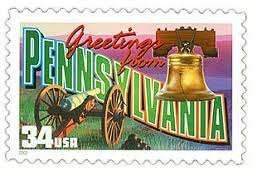Second Bill, Changed Language Complicate Pennsylvania Online Poker Legislative Scene
Pennsylvania’s pending legislative interest in the regulation of online poker and other forms of online gambling has moved forward in recent days with the introduction of a second, poker-only bill, and a brief modification to the first bill introduced last week, by PA State Rep. John Payne, with the meaning that the Payne bill would now authorize all forms of online gambling.
 First the Payne bill, House Bill 649. In its initial form as introduced last week, HB 649 included an internal definition which limited the bill’s reach to online poker only, and did not allow for the legalization and regulation of other forms of online gambling. That has since been changed, with the issuance of a new version of the bill, disavowing the original poker-only version as a “printer’s error”.
First the Payne bill, House Bill 649. In its initial form as introduced last week, HB 649 included an internal definition which limited the bill’s reach to online poker only, and did not allow for the legalization and regulation of other forms of online gambling. That has since been changed, with the issuance of a new version of the bill, disavowing the original poker-only version as a “printer’s error”.
Both the old and new versions of HB 649 established the bill’s initial reach to cover all forms of interactive gambling, then defined the bill’s intended reach through a series of subsequent definitions:
However, the original version then limited itself to poker through a secondary definition, and the latest version of that bill removed the poker-only limitation through the removal of the key word “poker”.
Old:
“Authorized game.” Any interactive poker game approved by the board under this chapter.
Revised:
“Authorized game.” Any interactive game approved by the board under this chapter.
As a result, HB 649 now stands as a measure designed to legalize all forms of online gambling, to be offered by already existing, state-licensed facilities.
However, the concept of an online poker-only bill receiving legislative consideration in Pennsylvania hasn’t disappeared, since another Pennsylvania state rep, Nick Miccarelli, has reintroduced his own poker-only legislation. Miccarelli made some headlines last July by introducing his own poker-only legislation. The 2014 version of the bill was denoted as HB 2297, and this year’s version, supposedly featuring identical core text, has now been submitted as HB 695.
The current version of the complete text of HB 695 has yet to be published by the state’s Assembly, though the primary statute should be identical to last year’s HB 2297, which is already available.
Miccarrelli’s bill, besides being poker-only, has other differences when compared against the Payne bill. Miccarelli’s version does not include language providing for the negotiation of multi-state, player-pooling compacts, and Miccarelli’s version does include “bad actor” language attempting to enforce mandatory license exclusions, based upon the 2006 passage of the UIGEA (Unlawful Internet Gambling Enforcement Act).
Like Payne, Miccarelli had previously announced his intent to submit his online-poker bill. Here’s the memo Miccarelli distributed to his PA Assembly colleagues earlier this month:
MEMORANDUM
Posted: February 6, 2015 03:35 PM
From: Representative Nick Miccarelli
To: All House members
Subject: Legislation- Interactive Gaming -Online pokerIn the near future, I will be re-introducing my legislation from the previous session (HB2297) that would authorize Interactive Gaming in the form of online poker. A recent study from the Legislative Budget and Finance Committee found that Internet Gaming is a large new source of revenue that the Commonwealth could explore. This means more revenue to assist in the reduction of real estate taxes. This bill will only authorize Internet Poker. Poker is unlike banking games in many respects that make it best for the introduction of interactive gaming. Poker operators are not participants in the games and are indifferent as to the outcome.
Additionally, many Pennsylvania residents participate in illegal and unregulated poker sites. Establishing a strong regulatory framework under the Gaming Control Board will assist in shutting down these illegal sites and enhance consumer protection for our gaming residents.
Specifically this bill will do the following:
Require all internet poker to be conducted under the current gaming licensees.
Require a licensing fee of $5 million per license.
Tax all gross interactive gaming revenue at 14%
Includes a Bad Actor Language which would exclude those who violated the Unlawful Internet Gambling Enforcement Act (UIGEA) of 2006.Please join me in supporting this legislation.
Miccarelli’s bill has yet to be assigned to any Pennsylvania House committee for further consideration.



















COMMENTS